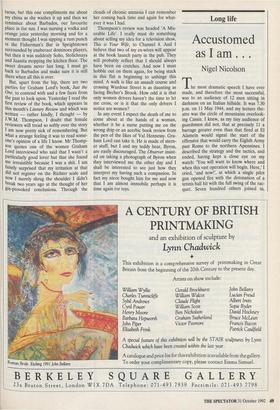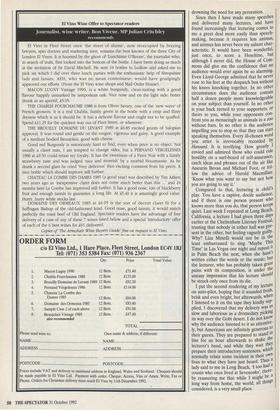Long life
Accustomed as I am . . .
Nigel Nicolson
The most dramatic speech I have ever made, and therefore the most successful, was to an audience of 12 men sitting in darkness on an Italian hillside. It was 7.30 p.m. on 11 May 1944, and my lecture the- atre was the circle of mountains overlook- ing Cassin. I knew, as my tiny audience of guardsmen did not, that at precisely 11 a barrage greater even than that fired at El Alamein would signal the start of the offensive that would carry the Eighth Army past Rome to the northern Apennines. I described the strategy and the tactics, and ended, having kept a close eye on my watch: 'You will want to know where and when this vast operation will begin. Here,' I cried, 'and now!', at which a single pilot gun opened fire with the detonation of a tennis ball hit with the full swing of the rac- quet. Seven hundred others joined in,
drowning the need for any peroration.
Since then I have made many speeches and delivered many lectures, and have found increasingly that lecturing comes to me a great deal more easily than speech- making, because it requires less animus, and animus has never been my salient char- acteristic. It would have been wonderful, just once, to score a Heseltine, but although I never did, the House of Com- mons did give me the confidence that no audience would ever again be so alarming. Even Lloyd George admitted that he never rose to his feet at the despatch box without his knees knocking together. In no other circumstance does the audience contain half a dozen people more knowledgeable on your subject than yourself. In no other is your back turned to your supporters, or theirs to you, while your opponents con- front you as menacingly as animals in a zoo without bars. In no other is the audience impelling you to stop so that they can start speaking themselves. Every ill-chosen word you utter is irrevocably recorded by Hansard. It is terrifying. How greatly I envied and admired those who could ride hostility on a surf-board of self-assurance, catch ideas and phrases out of the air like Aneurin Bevan and Michael Foot, or fol- low the advice of Harold Macmillan: `Know what you want to say but not how you are going to say it.' Compared to that, lecturing is child's play. You have a captive, docile audience, and if there is one person present who knows more than you do, that person keeps quiet. Last week I repeated at Long Beach, California, a lecture I had given three days earlier at the Cheltenham Literary Festival, trusting that nobody in either hall was pre- sent in the other, but feeling vaguely guilty' Why? Liza Minelli would not be in the least embarrassed to sing 'Maybe Th!s Time' in Las Vegas one night and repeat 1,t in Palm Beach the next, when she hasp t written either the words or the music; but the lecturer, who has probably taken great pains with its composition, is under the uneasy impression that his lecture should be struck only once from its die. I put the second rendering of my lecture on auto-pilot, hoping that it sounded fresh, brisk and even bright, but afterwards, when I listened to it on the tape they kindly sup- plied, I discovered that my delivery was as slow and laborious as a dromedary picking its way over the Gobi desert. I do not know why the audience listened to it so attentive- ly, but Americans are infinitely generous to their guests. They are prepared to stand In line for an hour afterwards to shake the lecturer's hand, and while they wait they prepare their introductory sentences, which normally relate some incident in their own lives to what they have just heard. Thus a lady said to me in Long Beach, 'I too had a cousin who once lived at Sevenoaks', there- by reassuring me that while I might be 3 long way from home, the world, all things considered, is a very small place.



























































 Previous page
Previous page